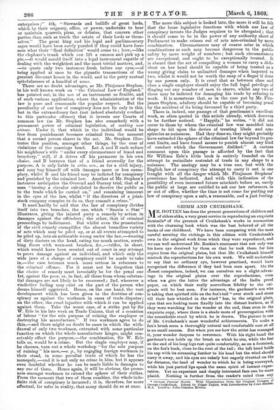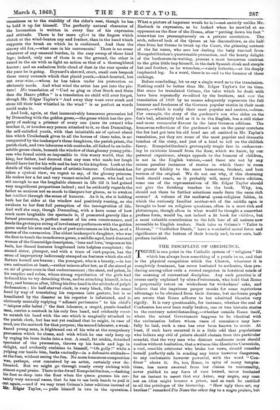GRIMM AND CRUIKSHANK.
1VIa. ROTTEN has done the present generations of children and of elders alike, a very great service in reproducing an exquisite facsimile* of the greatest of Cruikahank's works in connection with the charming book which was the best beloved of all the books of our childhood. We have been comparing with the most careful scrutiny the etchings in this edition with Crnikshankls own in the original work from which they were reproduced, and we can well understand Mr. Ruskin's statement that not only was his keen eye deceived by them so that he took them for late copies from the original platesf but that Mr. Cruikshank himself mistook the reproductions for his own work. We will undertake to say that no ordinary eye, however practised, would have recognized the difference if they had been seen apart. On the closest comparison, indeed, we can ourselves see a slight advantage in the original plates over the reproductions, even when we give the latter the advantage of the India proof paper, on which their really marvellous fidelity to the originals will be best seen. For instance, the gardener's son who is taking that spirited ride on the fox's tail " over stock and stone till their hair whistled in the wind" has, in the original plate, eyes that are looking more fixedly into the distant horizon, as if they were watching for the wonder at the end, than even in the exquisite copy, where there is a shade more of preoccupation with the remarkable steed by which he is drawn. The picture is one of Mr. Cruikahank's most wonderful achievements. To make a fox's brush seem a thoroughly natural and comfortable seat at all is no small success. But when you see how the artist has managed it, your wonder deepens to reverence. With his right hand the gardener's son holds up the brush on which he sits, while the feet at the end of his long lege rest quite comfortably, as on a footstool, on the fox's back, close to the root of the tail ; the left hand holds his cap with its streaming feather to his head lest the wind should carry it away, and his eyes are calmly but eagerly rivetted on the far distance, the land of wonder to which he is being conveyed, while his just parted lips speak the same spirit of instant expectation. Yet no expectant and deeply interested face can be more placid. Nothing is further from the reader's mind than any uneasiness as to the stability of the rider's seat, though he has to hold it up for himself. The perfectly natural character of the locomotion is written in every line of his expression and attitude. There is far more effort in the fingers which clutch at the wind-beaten cap and feather, than in the hand which supports the brush on which he is cushioned. And then the sinewy old fox,—what ease in his movements] There is no sense whatever of any unusual burden, in the easy sweep of those hind legs; indeed, only one of them is ou the ground, the other is raised in the air with as light an action as that of a thoroughbred hunter; and an ambitious little cloud of dust in the rear speaks of the pace he is going. Reynard's shrewd, erect, small ears bespeak those many counsels which that placid youth,—kind-hearted, but not over-wise,—whom he has taken under his protection so obviously needs. And what wind the artist has put into the picture! His translation of " Und so ging es fiber Stock and Stein -class die Haare pfiffen " is a translation no child will ever forget, though Mr. Edgar. Taylor's "And away they went over stock and stone till their hair whistled in the wind" is as perfect as words could make it.
And look, again, at that inconceivably humorous procession led by Dummling with the golden goose,—the goose which has the property of making a prisoner of every one (save its owner) who touches it, or touches any person attached to it, so that Dummling, the self-satisfied youth, with that inimitable air of aplomb about him which Craikshank gives to all the heroes of these tales, is accompanied by the innkeeper's three daughters, the parish priest, the parish clerk, and two labourers with mattocks, all linked in an indissoluble goose-chain, beneath the window of that gloomy young princess who found mirth so impossible in this weary world, that the king, her father, had decreed that any man who made her laugh should have her for his wife and be heir to his •kingdom. Look at the -details of this unrivalled piece of artistic humour. Cruikslutnk has taken a cynical view, we regret to say, of the gloomy princess. He makes her a fat and very vacant-minded person, who had not wit enough to see the laughable element in life till it had gained very magnificent proportions indeed ; and he evidently regards the father as anxious not soinuch to dissipate her gloom, as to awaken her intellect through the-sense of humour. As it is, she is holding both her fat sides at the window and positively roaring, as she awakens to her first full perception of the incongruities of life. And well she may, though Dummling, with a keen sense of how much more laughable the spectacle is, if presented gravely like a formal procession, is perfect master of his own countenance, and heads the grotesque string of involuntaryperformers with the golden goose under his arm and an air of pert seriousness on his face, as of a master of the ceremonies..The eldest innkeeper's daughter, who was the first to touch the treacherous •goose, a middle-aged, hard-featured woman of the Gummidge description, ' lone and lorn,' trapeses at his heels, her dismal features lengthened into helpless complaint; the second sister, plumper, and with a trace of curl-papers, has the sense of impropriety ludicrously stamped on features which she still Ratters herself are buxom ; the youngest, who is a beauty,—in her own estimation at least,—rather minces after her, as if she aimed at an air of grace even in that embarrassment ; the stout, red priest, in his surplice and robes, whose strong reprobation of the girls had induced him to try detaching them, and so attaching himself, is in a fury, and bounces after, lifting his free hand in the attitude of pulpit -declamation ; his half-starved clerk, in runty black, lifts the same hand by way of translating his responses into gesture, but is as humiliated by the disaster as his superior is infuriated, and is -obviously mentally replying " adhassit pavimento " to his chief's "iniquos odio habui ;" the first labourer, a stupid, puzzle-headed man, carries a mattock in his only free hand, and evidently :cants to scratch his head with the one which is magically attached to the parish clerk, but has not yet realized that he might, in case of need, use the mattock for that purpose; the second labourer, a weakkneed young man, is frightened out of his wits at the compulsory procession which he closes, and with which he can only keep up by urging his loose limbs into a trot. A small, fat urchin, detached spectator of the procession, throws up his hands and legs in delight, and evidently exclaims to himself, "Oh golly !" while a yelping cur beside him, barks excitedly—in a defensive attitude— at the fuss, without seeing the fun. No more humorous composition was, perhaps, ever conceived by an artist, certainly ever delineated. But we might go through nearly every etching with almost equal praise. There is the dwarf Rumpelatiltzchen,—dashing
his foot so deep into the floor when the queen guesses his certainly very unusual name, that he has to use both hands to pull it out again,—and if we may trust Grimm's later editions instead of Mr. Edgar Taylor, — pulls himself in two in the operation.
What a picture of impotent wrath he is !—not entirely unlike Mr. Roebuck in expression, as he looked when he scowled at an opponent on the floor of the House, after "putting down his foot " somewhat too presumptuously ou a private conviction. The arch, relieved look of the Queen at his discomfiture, as site half rises from her throne to break up the Court, the grinning content of the fat nurse, who sees her darling the baby rescued from Rumpelstiltzchen's questionable protection, and the hearty delight of the beefeaters-in-waiting, present a most humorous contrast to the grim little imp himself, in the dark Spanish cloak and steeple hat and feather, as he wrenches,—vainly hitherto,—at his deeply implanted leg. In a word, there is no end to the humour of these etchings.
Before concluding, let us say a single word as to the translation. Nothing could be better than Mr. Edgar Taylor's for its time. But since he translated Grimm, the tales which he dealt with have been repeatedly re-edited by the brothers, and now the translation of 1826 by no means adequately represents the full humour and freshness of the German popular stories in their most recent,—which is really their most popular and ancient, —dress. For example, the story of the gardener's son who rides on the fox's tail, admirably told as it is in the English, has a still richer and more vernacular flavour in the later German editions. The humorous reflections of the gardener's son on the queer crotchets the fox had got into his old head are all omitted in Mr. Taylor's translation, yet they are some of the most popular and dramatic touches of the story, and just of a kind to tell ou the childish fancy. ltumpelstiltzchen's grotesquely tragic fate in endeavouring to extricate himself from the floor, which we know, by our personal experience, always appeals to the humour of children, is not in. the English version, —and these are not by any means peculiar instances of stories in which there is room for greater fidelity to the most humorous, freshest, and best version of the original. We do not see why, if this charming book should reach, as it probably will, many future editions, some one of the representatives of Mr. Edgar Taylor should not give the finishing touches to the book. Why, too, should not there be further selections made from the same rich source? A volume of the mediasval quasi-religious fables,, in which the curiously familiar mother-wit of the middle ages is brought to bear on religious questions, often in a most rich and picturesque, though often in what would be thought a somewhat profane form, would be, not indeed a fit book for children, but a most valuable contribution to the folk lore of all nations now accessible to English readers. Such tales as Grimm's "Tailor in Heaven," " Godfather Death," have a wonderful moral force and significance at the bottom of their homely and, to our ears, halfprofane incident.



































 Previous page
Previous page